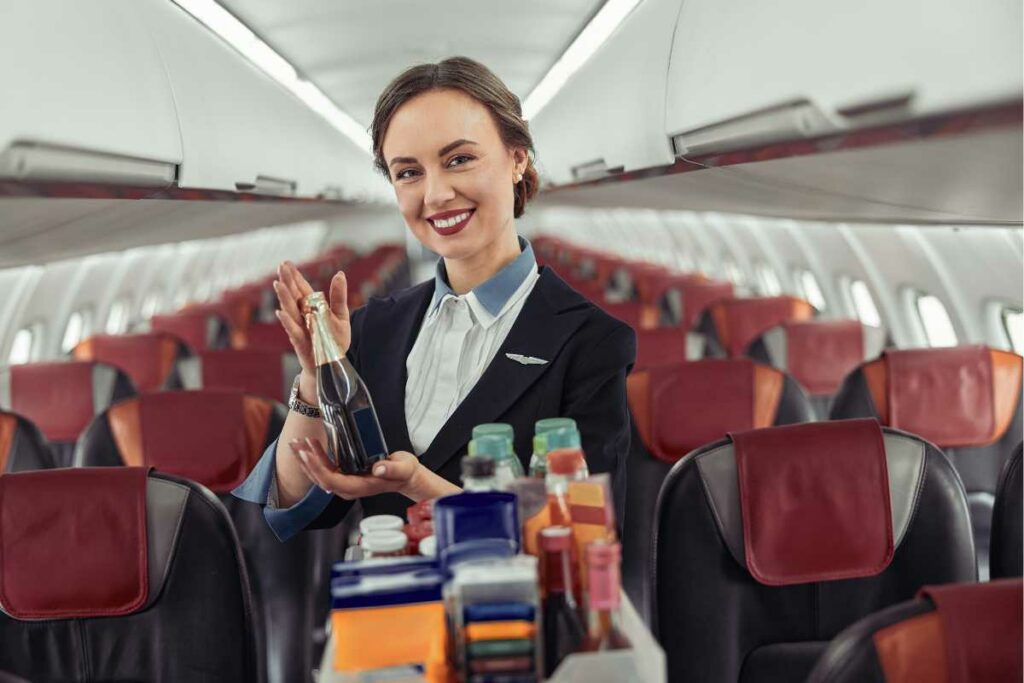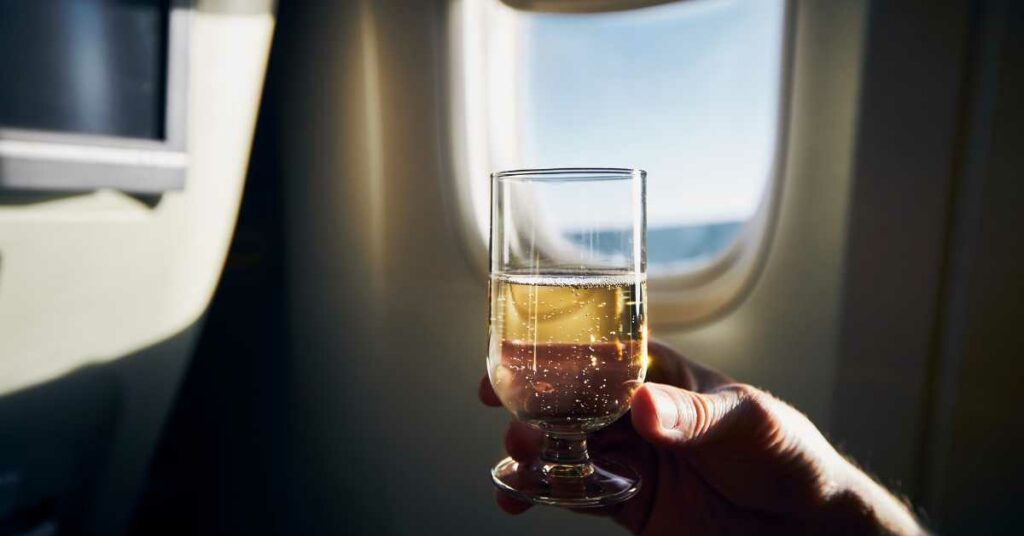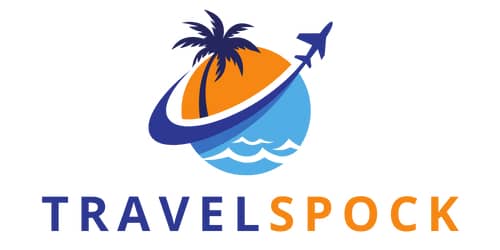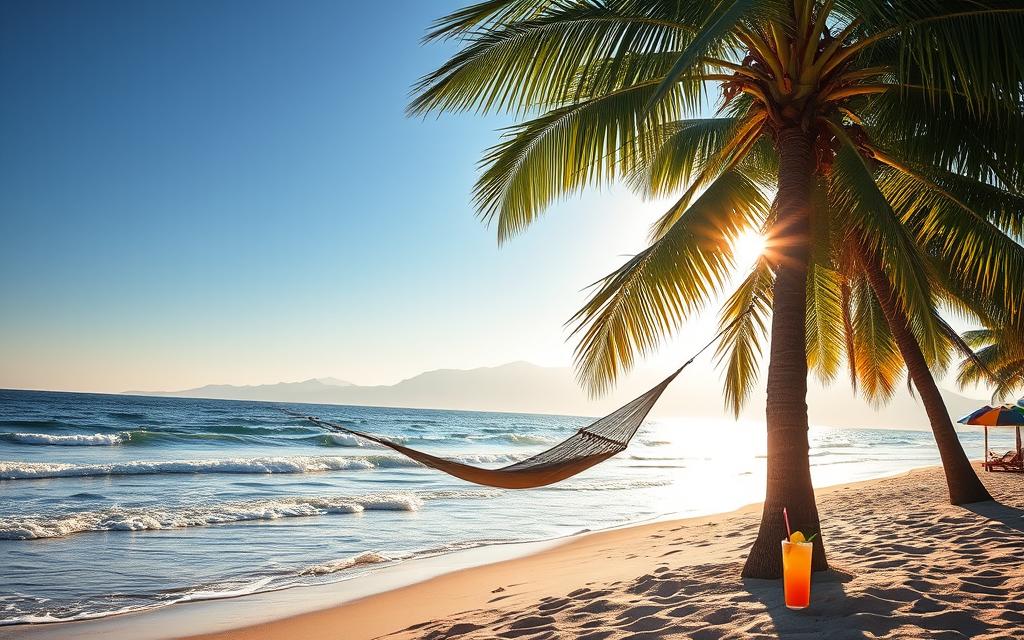When you’re booking a flight, you may come across the term “dry airline.” But what exactly does this mean?
A dry airline refers to a carrier that does not serve alcoholic beverages on its flights. This can be a result of religious, cultural, or legal reasons in the countries where these airlines are based.
Flying on a dry airline might be an unfamiliar experience if you’re used to enjoying a glass of wine or a cocktail while traveling.
However, it’s essential to respect the rules and customs of the airline and its country of origin. It’s worth noting that some airlines have certain restrictions related to alcohol, such as not serving it on specific flights or during particular times, while others ban it completely.
For example, Airlines that operate dry international flights include carriers like Kuwait Airways, Iran Air, and Saudi Arabian Airlines.

When planning your next trip, it’s helpful to know what to expect onboard a dry airline, as it may affect your overall travel experience.
Remember, a bit of research can go a long way in ensuring a comfortable journey, regardless of the airline’s policies regarding alcohol consumption.
Understanding Dry Airlines
When you travel, especially to certain regions, you might find yourself on a dry airline. A dry airline is an airline that does not serve alcoholic beverages on its flights.
There are various reasons why an airline may choose to be dry, such as cultural, religious, or regulatory factors. This is often associated with airlines from countries where alcohol consumption is restricted by Islamic law.
However, there are other airlines that have also implemented such restrictions for specific flights or durations.
Some well-known dry airlines include EgyptAir, Saudia (Saudi Arabian Airlines), and Royal Brunei Airlines.
These airlines are based in countries where alcohol restrictions are imposed due to religious beliefs. While the consumption of alcohol may not be illegal in these countries, it is often highly regulated.
Other airlines from Islamic countries like Turkish Airlines, Oman Air, Mahan Air, and Pakistan International Airlines may serve alcohol on their international flights, but might not offer it on domestic flights.
For example, alcohol is available on Turkish Airlines’ international flights, but it is not served on domestic flights due to cultural and regulatory reasons.

It’s not just Middle Eastern carriers that refrain from serving alcohol. Malaysia Airlines introduced alcohol restrictions, refraining from serving it on flights less than three hours long. This move was made to accommodate the airline’s customers with various faiths in mind, as it is a majority-Muslim country.
Furthermore, there are airlines like Ariana Afghan, Biman Bangladesh, and Jazeera Airways that are also considered dry airlines. It is important to check the policies of the airline you plan to fly with to ensure you are aware of such restrictions.
While some dry airlines are more strict than others, it is common for passengers to be subjected to additional rules or screening procedures when flying with a dry carrier.
For instance, Iraqi Airways has strict baggage and security checks to ensure that no alcohol is brought onboard, while Qatar Airways and Gulf Air implement restrictions on the amount of alcohol that can be purchased in duty-free shops and brought onboard.
Airlines from North African countries like Air Algerie and Tunisair do not serve alcohol on board, due to a combination of cultural, religious, and regulatory factors. However, some low-cost carriers in the region, like Flyadeal and Flynas, do offer alcoholic beverages on their flights, as long as passengers purchase it as an additional service.
List of dry airlines
- Saudi Arabian Airlines (Saudia): Adheres to religious considerations, as alcohol is prohibited in Islam.
- Iran Air: Consistent with Islamic principles, alcohol is generally not served on their flights.
- Kuwait Airways: Aligns with cultural norms and typically does not serve alcohol on board.
- EgyptAir: While it used to offer alcohol, on certain routes, it may align with religious considerations or specific circumstances where alcohol isn’t served.
- Pakistan International Airlines (PIA): Often follows a policy of not serving alcohol on its flights, respecting cultural and religious preferences.
- Royal Brunei Airlines: Adheres to religious reasons as alcohol is prohibited in Brunei.
- Air Arabia: This low-cost carrier does not serve alcohol on its flights.
- Gulf Air: While it historically served alcohol, it might have limited or no alcohol service on certain flights for various reasons.
- Somali Airlines: Cultural and religious considerations lead to no alcohol service.
- Iraqi Airways: Typically doesn’t serve alcohol, possibly due to cultural reasons.
- Libyan Airlines: Alcohol might not be served due to cultural or regulatory considerations.
- Yemenia: Often does not serve alcohol due to cultural and religious factors.
- Syrian Air: Adheres to cultural norms and may not serve alcohol on its flights.
- Tajik Air: Cultural considerations might lead to limited or no alcohol service.
- Sudan Airways: Aligns with cultural norms and might not serve alcohol on its flights.
Alcohol Restrictions and Regulations
Various airlines have different policies regarding alcohol consumption and carry on board.
Some airlines, such as Air Arabia and Iran Air, entirely prohibit the consumption and serving of alcohol on their flights. These are often referred to as “dry airlines.”
It’s important to review your airline’s “conditions of carriage” before boarding, as this document outlines specific rules related to alcohol on flights. Airlines may also impose restrictions on domestic flights in accordance with local laws or regulations.
When it comes to carrying alcohol, there are strict guidelines on the alcohol content you can bring on board.
You are allowed to carry alcoholic beverages in your carry-on luggage if the alcohol content is less than or equal to 3.4oz/100ml. However, it’s recommended to check with your airline before bringing any alcohol on board, as each airline may have different rules.
Regarding the consumption of alcohol brought on board, FAA regulations prohibit travelers from consuming their alcohol on an aircraft unless served by a flight attendant.
You are also not allowed to bring your own alcohol on board (BYOB) in most cases.
When purchasing duty-free alcohol at the airport, the items should be packed securely in a tamper-evident bag. Remember to keep your duty-free purchase receipt, as it may be requested by the airline or local customs officials.
It’s also worth noting that aside from alcohol consumption, smoking is typically not allowed on flights. Airlines have different penalties and fines for violating this rule, which can be found in their respective conditions of carriage.
Understanding On-board Services
When flying with a dry airline, it’s essential to know what services you can expect on board. The term “dry airline” refers to carriers that do not serve or allow alcohol consumption during flights. This restriction is often due to cultural or legal norms of the airline’s home country.
On such airlines, you will still receive professional service from the cabin crew. Whether you’re flying in first class or economy class, dedicated flight attendants will cater to your needs during your flight. They’ll ensure you’re comfortable in your cabin and help you with your checked baggage as needed.
As a passenger, you can anticipate a variety of meal options to choose from, often tailored to accommodate dietary and religious preferences.
These meals typically include a selection of high-quality ingredients, and you may even receive first-class meals, featuring premium dishes such as lobster thermidor or caviar.
Instead of alcohol, you’ll be offered a range of non-alcoholic drink options – from water and sparkling water to fruity mocktails. Dry airlines often go above and beyond to ensure passengers have an enjoyable and refreshing beverage selection during their flight.
In terms of pricing, ticket fares for dry airlines can be competitive, as the reduced cost of not serving alcohol helps offset other expenses. This can result in attractive rates for you as a passenger, without compromising on service quality or in-flight comfort.
Remember that while the restriction on alcohol might be a central aspect of a dry airline, many other on-board services remain unaffected.
You can still expect top-notch customer service, excellent meal choices, and comfortable cabin conditions when flying with a reputable dry airline.
Embrace the opportunity to experience a different journey in the skies, knowing that your needs will be cared for by attentive and professional crew members.
Implications on Travel Experiences
When booking your flights, especially for long-haul journeys or business-class experiences, it’s essential to consider the implications of flying on a dry airline.
On the one hand, you might miss out on the relaxation that a glass of wine or a cocktail can offer. However, on the other hand, flying without alcohol can actually lead to a healthier travel experience. Alcohol tends to dehydrate you and worsen the effects of jet lag.
For passengers looking to accrue miles and points through loyalty programs such as Aeroplan, American Express, or United MileagePlus, flying on dry airlines may not affect your ability to earn these rewards.
However, it’s always best to check with the specific airline and loyalty program for their policies. You could also factor in the availability of award bookings and the quality of the in-flight experience when deciding whether to fly on a dry airline.
In terms of in-flight services, dry airlines often compensate for the lack of alcohol by providing high-quality alternative beverages and premium dining options.
For example, Qatar Airways offers luxurious non-alcoholic drinks, such as caviar, that can still elevate your on-board experience.
Similarly, Etihad provides a refined food and beverage service and a comfortable 1-2-1 business class seating configuration to make up for the absence of alcohol.
So, whether you’re planning a trip to Los Angeles, the Middle East, or any other destination, considering the implications of flying on a dry airline can help you prepare for a unique travel experience.
Keep in mind your personal preferences and needs to make an informed decision about which airline and travel experience best suits you.
Frequently Asked Questions
Do Saudia airlines serve alcohol?
No, Saudia airlines do not serve alcohol on their flights. They are a dry airline, which means that they follow a no-alcohol policy. You can still enjoy a range of non-alcoholic beverages and quality meals during your flight.
Are drinks offered on Kuwait Airways?
While drinks are offered on Kuwait Airways, alcohol is not served on their flights. Similar to Saudia airlines, Kuwait Airways adheres to a dry policy, meaning that passengers won’t be able to consume alcoholic beverages during their journey.
Is alcohol available in Economy class on Turkish Airlines?
Yes, Turkish Airlines does serve alcoholic beverages in Economy class. Unlike some other Middle Eastern carriers, Turkish Airlines does not follow a dry policy, allowing passengers to enjoy an assortment of alcoholic drinks during their flight if they choose to do so.
What is Gulf Air’s policy on serving alcohol?
Gulf Air, the national carrier of Bahrain, does serve alcohol on its flights. While it is a Middle Eastern airline, it does not adhere to a strict dry policy like some of the other carriers in the region. Passengers can enjoy a selection of alcoholic beverages while on board.
Do Royal Jordanian flights provide alcoholic beverages?
Yes, Royal Jordanian flights offer alcoholic beverages to their passengers. The airline does not adhere to a dry policy; hence, you can enjoy a range of alcoholic drinks during your journey.
Which international airlines have a no-alcohol policy?
Some international airlines have a no-alcohol policy, for various reasons, including cultural or religious beliefs.
Examples of such airlines include Saudia, Kuwait Airways, and a few others. It is essential to research the airline’s alcohol policy before booking your flight if this is an important aspect of your travel experience.
Conclusion and final thoughts
In conclusion, a dry airline refers to an airline that does not serve alcoholic beverages on its flights.
This policy is often implemented for cultural, religious, or safety reasons. While some passengers may miss the option to enjoy a drink during their flight, dry airlines provide a unique experience that prioritizes different values and considerations.
Ultimately, understanding the policies of a specific airline can help travelers prepare for their journey and ensure a comfortable and enjoyable flight experience.









